How is the PRK Procedure Different from LASIK?
PRK, or Photorefractive Keratectomy, is an type of laser eye surgery that, like LASIK, corrects refractive errors such as nearsightedness (myopia), farsightedness (hyperopia), and astigmatism. The actual procedure process to reshape the cornea and allow light to focus on the retina, thus producing clear vision, is the same as with LASIK. The difference between LASIK and PRK is in how the epithelial layer on the front of the cornea is prepared prior to the cool-beam laser reshaping the cornea and how the eye is protected following the corneal reshaping. With LASIK, an hinged epithelial flap is created using a laser and lifted to expose the cornea for laser reshaping, With PRK, the epithelium is gently removed by a mild alcohol solution being applied for a short period of time, which loosens the epithelial cells allowing them to be easily wiped away. The, after the laser is used to reshape the cornea, a contact lens is placed in the eye for several days. This contact lens acts as a bandage and allows the epithelial cells to regenerate and cover the treated area, at which time the contact lens is removed.
When is PRK Laser Surgery the Better Option?
For a small percentage of patients, LASIK may not be the best laser vision correction option for them, so here at Whiting Clinic, we also utilize PRK, or Photorefractive Keratectomy as a laser vision correction procedure. Some reasons that may result in the medical team recommending PRK over LASIK are:
- Thinner Corneas: PRK is a better option for patients who have thinner corneas and are not suitable candidates for LASIK.
- Lifestyle Activities/Occupation: If a patient participates in contact sports or works in a profession which puts their eyes at risk of trauma, PRK may be a better and safer option as there is no corneal flap.
- Corneal Stability: PRK is often preferred for patients with unstable or changing prescriptions, as it preserves more corneal tissue compared to LASIK.
What is the Recovery Like After PRK?
Immediate Post-Procedure Period
Similar to LASIK, you may experience mild discomfort, light sensitivity, and a gritty sensation in your eyes. These sensations are normal and typically improve following a long nap after the procedure, although you should expect some blurry vision which improves as your eyes heal.
Week One
During the first week following PRK, you can anticipate some vision fluctuations as your eyes heal, with moments of clarity interspersed with periods of some blurriness. The removed epithelial layer gradually regenerates over the first few days. Strictly adhering to your post-operative instructions and use of wetting drops will help as your eyes are healing.
Weeks 2 – 4
You can expect steady visual acuity improvements with your vision becoming progressively clearer and more stable. The initial discomfort and sensitivity to light should diminish and most patients return to normal activities.
What Does PRK Correct?

Nearsightedness or Myopia is a comment refractive error that makes it difficult to see distant objects clearly. It occurs when the eyeball is too long or the cornea is too curved, causing light entering the eye to focus in front of the retina instead of on the retina. As a result, distant object appear blurry. PRK for nearsightedness works by reshaping the steeper curvature of the cornea, making it flatter, to ensure light focuses directly on the retina.

Astigmatism is a vision condition caused by an irregularly shaped cornea, often referred to as a football shaped cornea causing light entering the eye to focus on multiple points with in the eye. People with an astigmatism have distorted and blurred vision at all distances. Astigmatism often accompanies nearsighted or farsightedness. PRK for astigmatism works by reshaping the points of irregularity on the cornea, transforming it into a more symmetrical shape allowing light to focus evenly on the retina.

Farsightedness or Hyperopia is another common refractive error where close-up objects appeared blurred as a result of the light entering the eye focusing on a hypothetical point beyond the retina. PRK for farsightedness works by removing tissue from the other edges of the cornea, thus inducing curvature and allowing light to focus directly on the retina
Does PRK Correct Reading Vision?
Presbyopia is an age-related condition and noticed as a gradual loss of the eyes’ ability to focus up-close, especially when reading fine print or in dimly lit situations. Presbyopia is the result of the hardening or or loss of flexibility of the lens within the eye and most people become aware of presbyopia in their early to mid-40s and it typically worsens until around the age of 65. Since presbyopia is a lens and not a corneal condition, it alone is not correctable by PRK; however, if presbyopia is present with a refractive error, monovision PRK may be a good option to consider.
What is Monovision PRK?
Monovision PRK is a vision correction procedure which can address both near and far vision problems and may be a good solution for people who find themselves switching between their regular glasses for normal tasks and reading glasses for up-close work like reading. Unlike standard PRK, which treats both eyes for distance vision, the strategic approach of monovision PRK is tailored to provide clear distance vision in one eye and near vision in the other. Many people achieve monovision correction through the use of contact lenses prior to PRK. For most patients, the brain is quickly able to seamlessly integrate the visual information from each eye, resulting in clear vision both close-up and at a distance. The benefit of monovision PRK is that it eliminates or reduces a patients need for reading glasses. Additionally, through Whiting Clinic’s customized approach, Monovision PRK is highly customizable for each patient, with your surgeon tailoring the correction to suit your unique vision needs and activities. Of course, PRK can still be performed on patients with presbyopia to correct the refractive error in both eyes equally and the patient can use over-the-counter reading glasses when they notice the need for up-close work like reading.
Find out if LASIK or PRK is right for you –> Scheduled a FREE Consultation

At Whiting Clinic Minneapolis, we offer multiple ways for you to find out if LASIK or PRK is right for you – free of charge.
At Whiting Clinic, we offer options for those interested in laser vision correction to learn more about laser eye surgeries including LASIK and PRK, and find out if a Whiting Clinic procedure is right for them.
Our TeleHealth Appointments (Virtual Consultations) are a great place to start your journey. These appointments take 20-30 minutes and are conducted virtually so you can participate from where ever you are. During your TeleHealth appointment, we can answer your questions about the procedure and the process, provide you with a price quote, and take you through payment options, including guaranteed financing‡. We can also get you scheduled for your pre-treatment visual testing which can even be arranged on your treatment day if you are eager to move forward and start your life after laser vision correction!
We also offer in-center appointments for those who are more comfortable starting their journey in person. These appointments take about 90 minutes and include everything done during the TeleHealth appointment, plus the pre-treatment testing. After your appointment, we can also get you scheduled for your treatment.
‡Financing Options Guaranteed with Premier Pay in-house financing: Down payment amount varies from $0 to $1,000 per eye based on FICO score. The interest rate is based on program length and varies from 0% to 19.99% APR. A $25 set-up fee and a $3 monthly processing fee may apply. No minimum purchase amount is required.
Frequently Asked Questions
Over the years, we’ve heard many myths about LASIK. After all, we’ve been in the field of laser vision correction longer than most. Please contact us with any questions.
u003cstrongu003eTrue.u003c/strongu003e You can have cataract surgery after correcting your vision with LASIK. Routine eye exams are the only way to identify eye conditions that may need treatment.
u003cstrongu003eTrue.u003c/strongu003e Even though your vision has been corrected, it is still essential to take care of your eyes by having a yearly routine eye exam.
u003cstrongu003eTrue.u003c/strongu003e It is important to have your evaluation to determine if LASIK is right for you. While LASIK isn’t right for some people, we are happy to say that the majority of our patients can have LASIK.
u003cstrongu003eTrue.u003c/strongu003e LASIK corrects nearsightedness, farsightedness, AND astigmatism. Your individual candidacy recommendation is based on meticulous diagnostic testing and your unique lifestyle.
u003cstrongu003eFalse.u003c/strongu003e LASIK technology has been evolving for over twenty years and has dramatically improved since 1996. Studies on patients who had earlier laser vision correction show their vision is still clear with no significant health effects. It is the most performed elective procedure in the world.
u003cstrongu003eTrue.u003c/strongu003e You will notice a dramatic improvement in your vision immediately after your procedure, and most patients feel comfortable driving the very next day!
u003cstrongu003eTrue.u003c/strongu003e Many of our patients describe the procedure as virtually painless. Some patients feel a stinging sensation for a short time afterward. Over-the-counter pain medication is enough to alleviate any discomfort.
u003cstrongu003eTrue.u003c/strongu003e The change made to your vision is permanent. Whiting Clinic offers a Lifetime Commitment for any future necessary laser vision enhancements.
Schedule Your Free LASIK Consultation.
We hope to speak with you soon and assist you on your journey toward better vision.
Schedule Now
